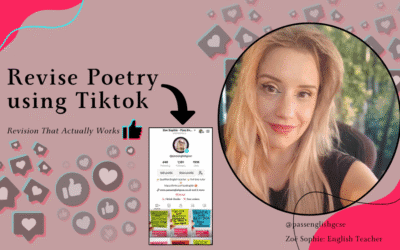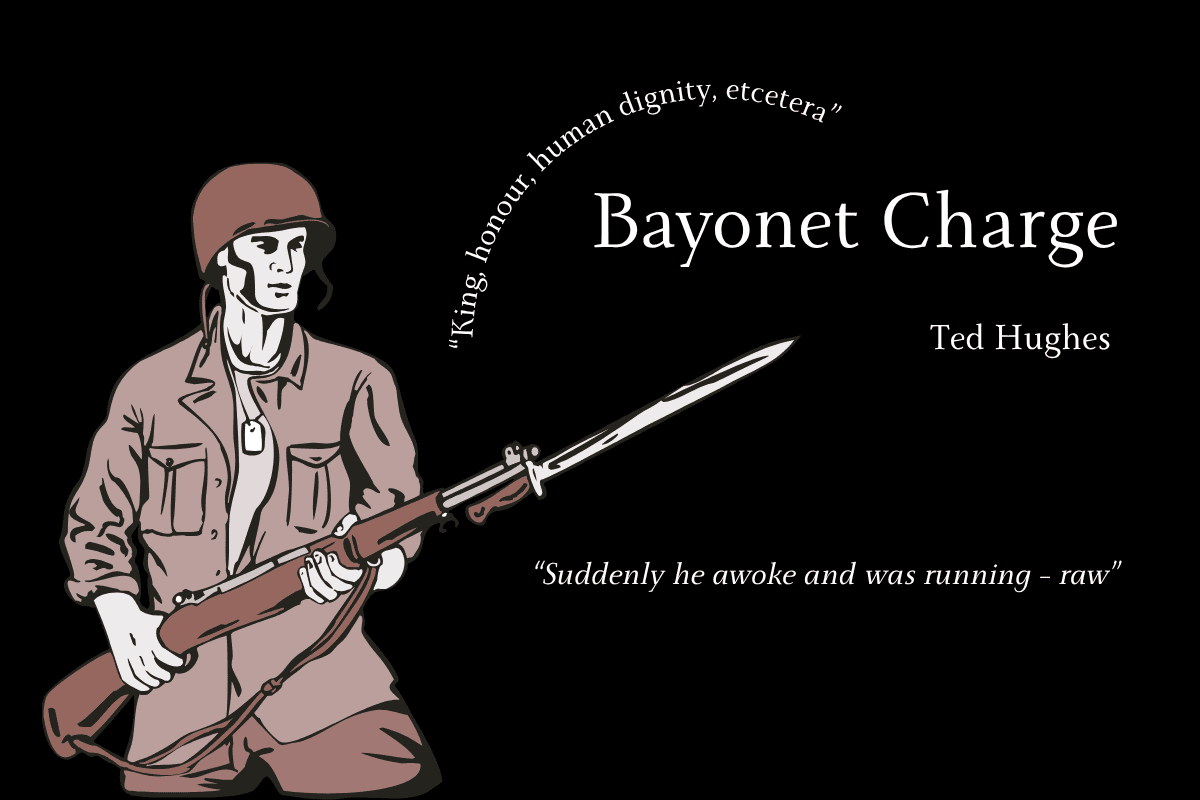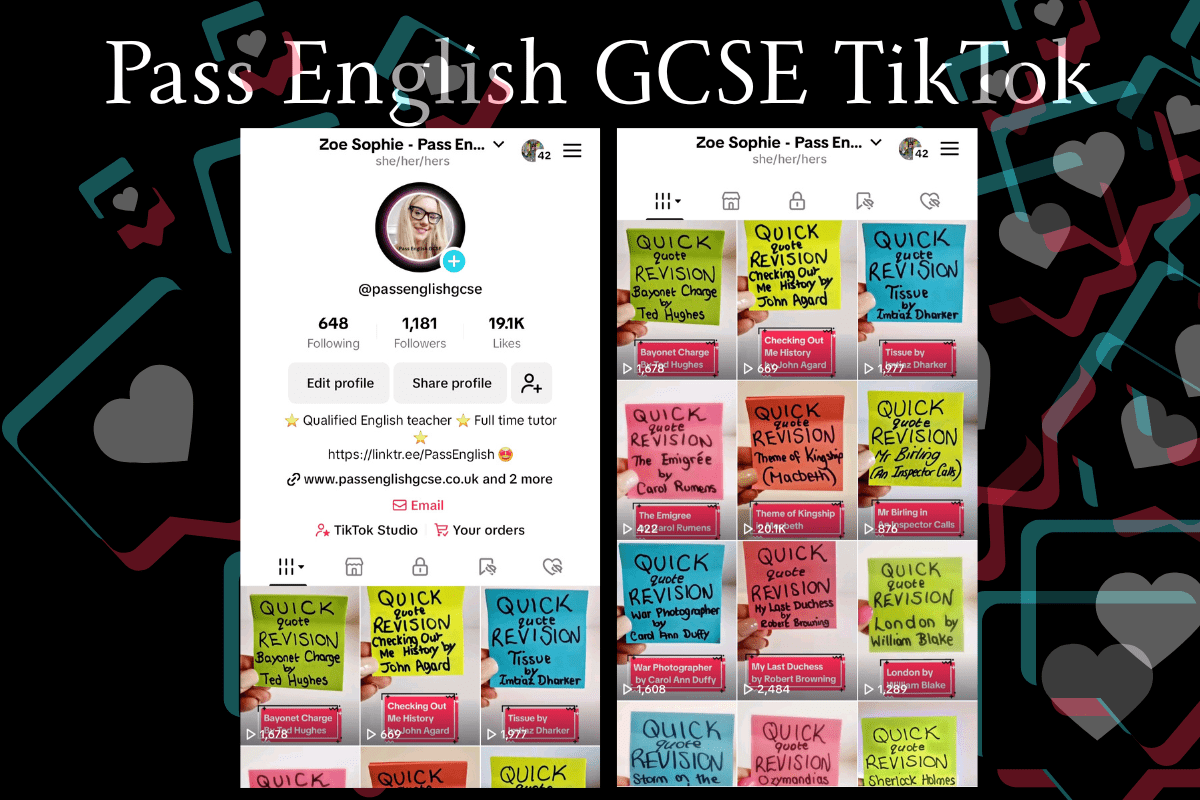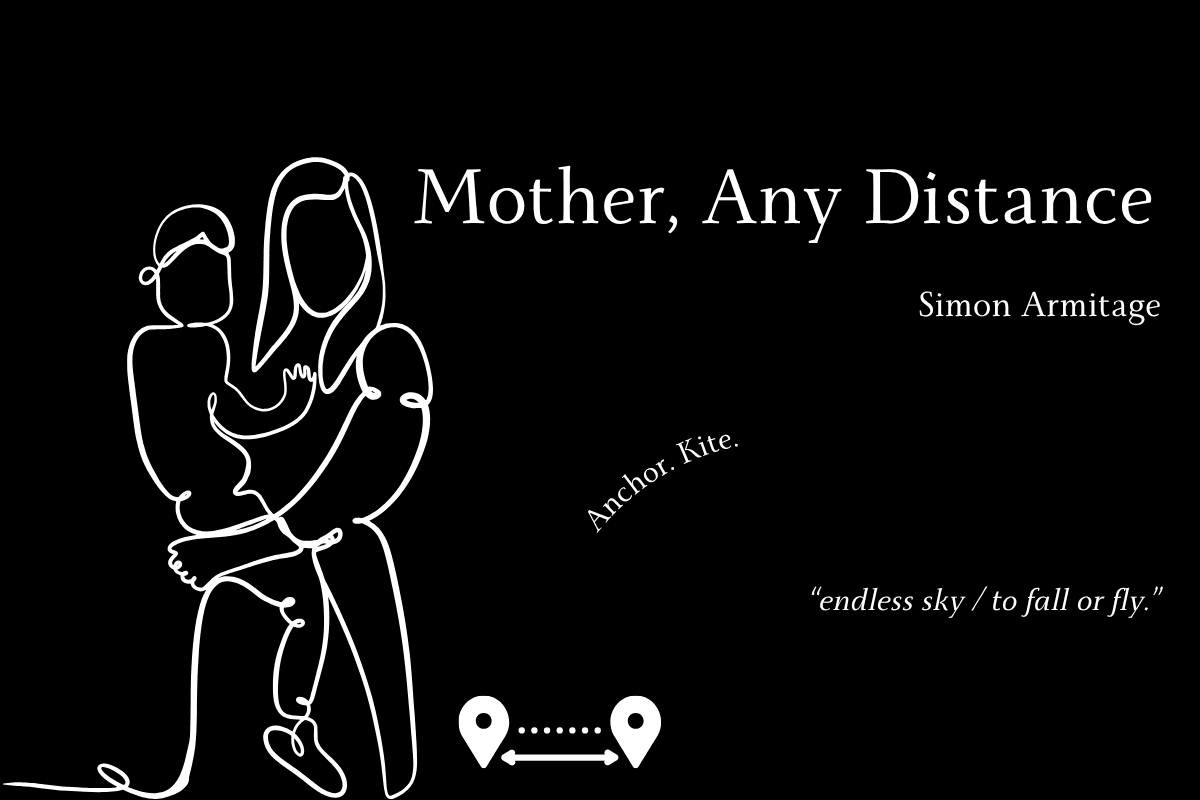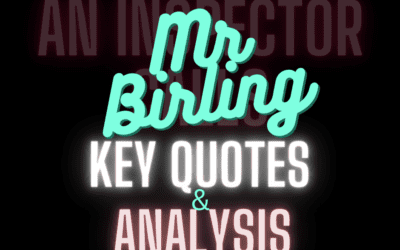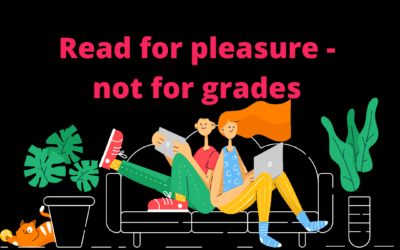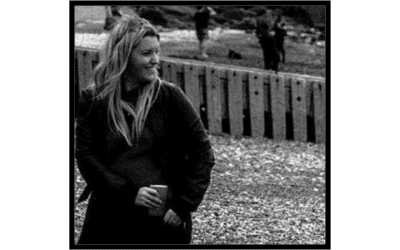Zoë's Blog
Advice and musings of an independent English specialistPower and Conflict: TikTok Revision That Actually Works
Power and Conflict - TikTok Revision That Actually Works
Are you or your children or students struggling to remember the Power and Conflict poems?
Is it feeling overwhelming trying to revise all 15 poems?
Perhaps this is because many are visual learners who find it easier to watch and listen rather than read endless notes?
If so, this blog is for you.
I’ve created a TikTok series that breaks down each poem in under three minutes. It’s designed for students who need clear, fast, and visual content to help things stick.
Let’s explore how TikTok can be used for effective GCSE English revision…
Why TikTok helps with English revision
Many of the students I teach are visual learners. They find it easier to remember a colour-coded image, a voiceover, or a quick video explanation than a dense paragraph in a textbook.
Each TikTok covers:
- 2 or 3 key quotes
- A quick overview of the poem’s message
- Visual cues to help with memory
- A focus on key techniques or structure
- Post-It-Notes with clear, short text to watch on mute or to music.
Many GCSE students are visual learners. A 2019 study by Durham University found that learners who watched short educational videos with visual prompts performed significantly better in conceptual tasks than those using text-based materials alone. (Fiorella & Mayer, 2019; Durham University co-authored study via arXiv:1701.04497).
This supports why platforms like TikTok – when used strategically – can become powerful revision tools. My TikToks and YouTube videos are designed with this in mind: short, clear, visual, and focused on key quotes and techniques.
But watching a video alone won’t get you a Grade 9. You still need to practise writing clearly and analytically. Let’s build on two example videos with paragraph models you can use for revision.
Example: Bayonet Charge
🎥 Watch the Bayonet Charge TikTok
In this TikTok, I focus on the panic and chaos of war. The video includes these two key quotes:
- “Suddenly he awoke and was running – raw”
- “King, honour, human dignity, etcetera”
Analysis:
Bayonet Charge explores the breakdown of rational thought during battle. Hughes opens with a jarring image: “Suddenly he awoke and was running – raw”. The adverb “suddenly” mirrors the soldier’s confusion, and “raw” shows that he’s been stripped back to instinct. Near the end, the listing of values: “King, honour, human dignity, etcetera” – with an almost sarcastic tone reveals how meaningless these ideals become in the face of real violence. Therefore, Hughes presents war as a terrifying and irrational experience.
Example: Exposure
🎥 Watch the Exposure TikTok
This video shows how nature becomes the true enemy. The key quotes featured are:
- “Merciless iced east winds that knive us…”
- “But nothing happens.”
Analysis:
Owen presents soldiers not as heroes, but as victims. Nature is personified as violent and deadly: “Merciless iced east winds that knive us…” The violent verb “knive” sounds brutal and unexpected, which makes the weather seem like an attacker. The repetition of “But nothing happens” (a refrain) creates a feeling of futility. Owen’s message is clear: the real enemy in war is not always the opposing army – more likely it’s the poor living conditions, the bleak weather, the fear and the waiting.
Revise using my AQA Power and Conflict poetry TikToks
Ready to download the full TikTok Companion Guide?
I’m currently putting together a free PDF to go alongside my TikTok series. It includes:
- Direct links to all 15 poem TikToks
- Key quotes and techniques for each poem
- Context notes
- Space to practise PETER+C-style paragraphs
You can download it here soon – but in the meantime visit my YouTube channel or sign up to my newsletter and I’ll email it to you when it’s ready.
“If you’re studying Love and Relationships, read the matching TikTok blog here.”
Love and Relationships: TikTok Revision That Actually Works
Love and Relationships - TikTok Revision That Actually Works
Are you or your children or students struggling to remember the Love and Relationship poems?
Is it feeling overwhelming trying to revise all 15 poems?
Perhaps this is because many are visual learners who find it easier to watch and listen rather than read endless notes?
If so, this blog is for you.
I’ve created a TikTok series that breaks down each poem in under three minutes. It’s designed for students who need clear, fast, and visual content to help things stick.
Let’s explore how TikTok can be used for effective GCSE English revision…
Why TikTok helps with English revision
Many of the students I teach are visual learners. They find it easier to remember a colour-coded image, a voiceover, or a quick video explanation than a dense paragraph in a textbook.
That’s why I created @passenglishgcse on TikTok — to provide fast, accessible revision videos for every poem in the AQA Love and Relationships cluster.
Each TikTok covers:
- 2 or 3 key quotes
- A quick overview of the poem’s message
- Visual cues to help with memory
- A focus on key techniques or structure
- Post-It-Notes with clear, short text to watch on mute or to music.
Many GCSE students are visual learners. A 2019 study by Durham University found that learners who watched short educational videos with visual prompts performed significantly better in conceptual tasks than those using text-based materials alone. (Fiorella & Mayer, 2019; Durham University co-authored study via arXiv:1701.04497).
This supports why platforms like TikTok – when used strategically – can become powerful revision tools. My TikToks and YouTube videos are designed with this in mind: short, clear, visual, and focused on key quotes and techniques.
But watching a video alone won’t get you a Grade 9. You still need to practise writing clearly and analytically. Let’s build on two example videos with paragraph models you can use for revision.
Example: Mother, Any Distance
🎥 Watch the Mother, Any Distance Tik Tok here
This video focuses on the tension between independence and attachment.
Key quotes featured:
- “Anchor. Kite.”
- “endless sky / to fall or fly.”
Analysis:
Armitage’s poem explores the moment a child begins to break away from their mother. The image “Anchor. Kite.” uses a metaphor to show their relationship – the mother holds him down, but also helps him fly. Later, the line “endless sky / to fall or fly” reflects both the freedom and risk that independence poses. Armitage presents growing up as an emotional and uncertain process.
Example: When We Two Parted
🎥 Watch the When We Two Parted Tik Tok here
This video highlights secrecy, betrayal and the lasting pain of lost love.
Key quotes included:
- “In silence and tears”
- “Thy vows are all broken”
Analysis:
Byron opens with “In silence and tears”, a phrase repeated at the end. This cyclical structure shows that his grief hasn’t faded. The broken vows highlight betrayal, and the line “Thy vows are all broken” makes the relationship feel like a failed contract. Byron presents heartbreak as something deeply painful and private – especially when it can’t be discussed openly.
Revise using my AQA Love and Relationships poetry TikToks
Ready to download the full TikTok Companion Guide?
I’m currently putting together a free PDF to go alongside my TikTok series. It includes:
- Direct links to all 15 poem TikToks
- Key quotes and techniques for each poem
- Context notes
- Space to practise PETER+C-style paragraphs
You can download it here soon – but in the meantime visit my YouTube channel or sign up to my newsletter and I’ll email it to you when it’s ready.
“If you’re studying Power and Conflict, read the matching TikTok blog here.”
Mr Birling – key quotes and analysis
Do you not know your key quotes?
Perhaps you need help with textual analysis?
Or maybe it is essay writing that is proving difficult at present.
Here is my explainer video analysing the opening stage directions to get you started – watch this first.
This can be done by watching the 5 key quotes videos on my YouTube playlist.
Let’s revise Mr Birling…
Who is Mr Birling?
Mr Birling is a capitalist which explains why socialist writer J.B Priestley presents him unfavourably and makes him appear foolish.
Mr Birling’s character is presented as rigid and difficult with the audience learning to dislike him.
By the end of the play Mr Birling has alienated his children and most of the audience.
Here is the opening of an example paragraph about Mr Birling’s character –
“The exposition of the play starts by describing Mr Birling as a “heavy-looking portentous man… rather provincial in his speech”. It opens by describing him sitting around a dining room in a large suburban house. Mr Birling is immediately perceived to be a upper-middle-class man with privilege. This descriptive statement in the stage direction alludes to the fact that Mr Birling is successful, however, the use of the adjective “portentous” proves that he is obnoxious and likes to elevate himself above his social standing.”
Mr Birling’s character is best explored through the opening stage directions…
“This urge to prove himself highlights how he prides himself on his social class and that he values class privilege highly, perhaps this is one of his most important values. This personal importance of social class could advocate that he even demeans people of a lower class, which is later proven true. The use of the adjective “provincial” conveys that he has always been confined to the comforts and familiarities of Brumley. This alongside the adjective portrays that he is narrow-minded and is entrenched in his views, especially when it comes to evaluating a person in their class (which he does to Eva Smith). The language creates a portrayal of Mr Birling as a class concerned man. Therefore, Mr Birling is presented as an obnoxious character.”
If remembering quotes is difficult for you then use a flashcard to help you remember Mr Birling’s key quotes and re-watch my videos to aid your revision.
Use this one (you can see what it looks like below).
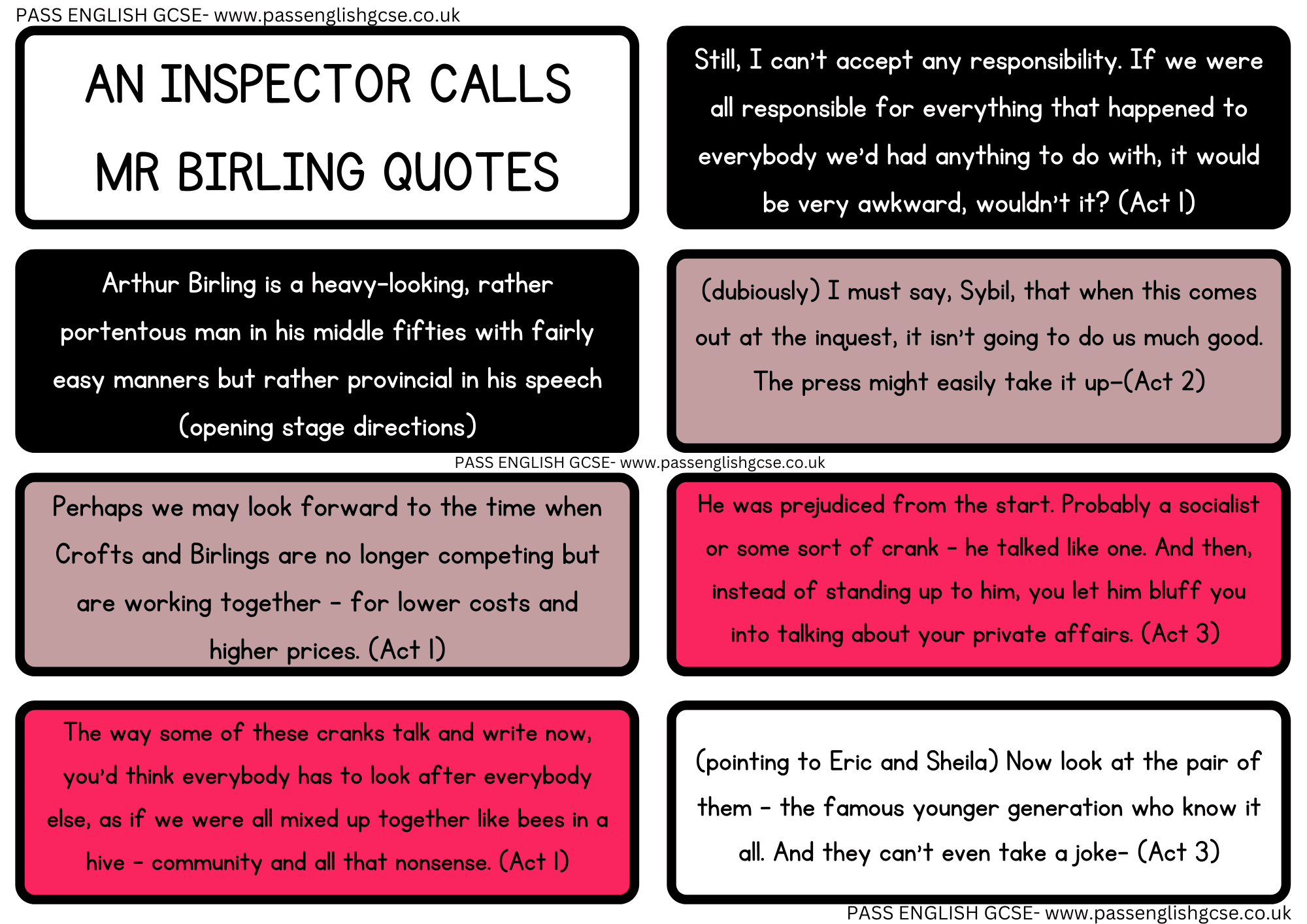
If you want to see all of Mr Birling’s key quotes then you can download them here and I would suggest using them to make mindmaps and cue cards.
Above all, these varied revision activities combined with re-watching the videos linked above, should also boost your confidence in this topic.
If you’d like even more FREE English resources then take a look here.
How Luca Carrick-Smith got grade 9s in both English GCSEs!
How Luca Carrick-Smith’s grade 9 English GCSE success is possible for home educated and school educated students alike.
How do I get my child to enjoy reading?
How do I find the best (English GCSE) tutor?
A guide for parents and students of all ages on selecting the right tutor to work with you.
Are you struggling to find the best private English GCSE tutor for you or for your child?
Or maybe it’s not even for English – but another subject? Maths?
You are not alone.
It is unsurprising that now a quarter of secondary school children have private tutors.
And many adults need help in the wake of GCSE resits and other mandatory credentials.
Whilst tutoring is an aspirational act to some, there are some rogue tutors out there.
So knowing who you’re dealing with is crucial.
So how do you know who to choose?

Many have asked “How do I find the best English GCSE tutor?”
or…
“How do I find the best tutor for [insert subject here]?”
Whilst there are financial constraints and necessary checks – tutoring clearly works.
It does work – I should know.
Here are three questions to ask in order to find the right (English) tutor for you.
1. Do they have enough subject knowledge?
Ask yourself:
- Do they have an English / [insert relevant subject] degree?
- Did they achieve an excellent degree pass? Check qualifications.
- Is there any evidence they currently write? (For anyone? / in their respective field?)
- Have they taught the credential before?
- And have they taught students before?
- Can they actually teach well? Ask previous students.
- What’s their pass rate? Find out.
- How long have they been teaching this specification? They ought to tell you.
You ought to find out this information at once.

It will help you to decide if the tutor has the knowledge and abilities you need.
They should tell you about themselves (example here).
And be happy to show you their setting and work.
And if they want to tutor you online their website should be fun and easy to use – like mine 🙂
But there are are many tutors around. Especially online tutors – so do your research. It’s worth it.
You should also ask yourself…
2. Do they connect with people and with you?
Think about it. You (or your child) want to learn from this person.
Whether you’re an adult, teen, or parent – learning can feel like a vulnerable place.
Are they approachable?
This person must be trustworthy, kind and considerate.
They must care about their students.

Ask yourself:
- How do they come across face to face/ online?
- Are they posting online regularly and do you like their message?
- Do you feel you can get to know them online?
- Are they happy to answer your questions?
- How do they help people? What have they done and what are they currently doing for others?
- Are there any FREE resources/ classes/ groups available to see if you or your child could learn from them?
Don’t underestimate this stuff. It matters a great deal if you or your child are to learn successfully.
It needs to be comfortable to learn and that means connection is key.
Do you feel you know them?
And if you’re a parent of a child tutored face to face – does your tutor invite you to observe their teaching every session? They ought to.
And finally….
3. Do their efforts outweigh their costs?
We all know 1-2-1 tuition sessions cost money.
And generally the best tutors aren’t cheap. They’re the pros who have been perfecting this for years.
But their efforts must outweigh their costs.
GCSE English Language / Literature are important exams. If you cannot pass Language you’ll have to resit.
It’s the same for other core subjects and any other exam you care about.
People can get stuck and no one wants to fail.
Of course everyone wants to pass first time so their tutor may look this DELIGHTED on Results Day (yes, I was really HAPPY) 🙂

That means your tutor’s efforts must be equal to or worth more than their cumulative hourly rate.
Look at:
- Their integrity.
- Teaching abilities, including personal connection.
- Quality of feedback.
- Kindness.
Research the tutor. Talk to previous students. Read their website and blog. Ask questions.
And if after all that you’re not satisfied – move on.
Life is too short. Tutoring is too expensive to get the wrong tutor.
Do your research with these three questions in mind to find the right person.

And if you still need some help with English I’m always happy to advise 🙂
I can’t help with Maths though (although this lady can – her online tutorials are great!)
Power and Conflict: TikTok Revision That Actually Works
Power and Conflict - TikTok Revision That Actually Works
Are you or your children or students struggling to remember the Power and Conflict poems?
Is it feeling overwhelming trying to revise all 15 poems?
Perhaps this is because many are visual learners who find it easier to watch and listen rather than read endless notes?
If so, this blog is for you.
I’ve created a TikTok series that breaks down each poem in under three minutes. It’s designed for students who need clear, fast, and visual content to help things stick.
Let’s explore how TikTok can be used for effective GCSE English revision…
Why TikTok helps with English revision
Many of the students I teach are visual learners. They find it easier to remember a colour-coded image, a voiceover, or a quick video explanation than a dense paragraph in a textbook.
Each TikTok covers:
- 2 or 3 key quotes
- A quick overview of the poem’s message
- Visual cues to help with memory
- A focus on key techniques or structure
- Post-It-Notes with clear, short text to watch on mute or to music.
Many GCSE students are visual learners. A 2019 study by Durham University found that learners who watched short educational videos with visual prompts performed significantly better in conceptual tasks than those using text-based materials alone. (Fiorella & Mayer, 2019; Durham University co-authored study via arXiv:1701.04497).
This supports why platforms like TikTok – when used strategically – can become powerful revision tools. My TikToks and YouTube videos are designed with this in mind: short, clear, visual, and focused on key quotes and techniques.
But watching a video alone won’t get you a Grade 9. You still need to practise writing clearly and analytically. Let’s build on two example videos with paragraph models you can use for revision.
Example: Bayonet Charge
🎥 Watch the Bayonet Charge TikTok
In this TikTok, I focus on the panic and chaos of war. The video includes these two key quotes:
- “Suddenly he awoke and was running – raw”
- “King, honour, human dignity, etcetera”
Analysis:
Bayonet Charge explores the breakdown of rational thought during battle. Hughes opens with a jarring image: “Suddenly he awoke and was running – raw”. The adverb “suddenly” mirrors the soldier’s confusion, and “raw” shows that he’s been stripped back to instinct. Near the end, the listing of values: “King, honour, human dignity, etcetera” – with an almost sarcastic tone reveals how meaningless these ideals become in the face of real violence. Therefore, Hughes presents war as a terrifying and irrational experience.
Example: Exposure
🎥 Watch the Exposure TikTok
This video shows how nature becomes the true enemy. The key quotes featured are:
- “Merciless iced east winds that knive us…”
- “But nothing happens.”
Analysis:
Owen presents soldiers not as heroes, but as victims. Nature is personified as violent and deadly: “Merciless iced east winds that knive us…” The violent verb “knive” sounds brutal and unexpected, which makes the weather seem like an attacker. The repetition of “But nothing happens” (a refrain) creates a feeling of futility. Owen’s message is clear: the real enemy in war is not always the opposing army – more likely it’s the poor living conditions, the bleak weather, the fear and the waiting.
Revise using my AQA Power and Conflict poetry TikToks
Ready to download the full TikTok Companion Guide?
I’m currently putting together a free PDF to go alongside my TikTok series. It includes:
- Direct links to all 15 poem TikToks
- Key quotes and techniques for each poem
- Context notes
- Space to practise PETER+C-style paragraphs
You can download it here soon – but in the meantime visit my YouTube channel or sign up to my newsletter and I’ll email it to you when it’s ready.
“If you’re studying Love and Relationships, read the matching TikTok blog here.”
Love and Relationships: TikTok Revision That Actually Works
Love and Relationships - TikTok Revision That Actually Works
Are you or your children or students struggling to remember the Love and Relationship poems?
Is it feeling overwhelming trying to revise all 15 poems?
Perhaps this is because many are visual learners who find it easier to watch and listen rather than read endless notes?
If so, this blog is for you.
I’ve created a TikTok series that breaks down each poem in under three minutes. It’s designed for students who need clear, fast, and visual content to help things stick.
Let’s explore how TikTok can be used for effective GCSE English revision…
Why TikTok helps with English revision
Many of the students I teach are visual learners. They find it easier to remember a colour-coded image, a voiceover, or a quick video explanation than a dense paragraph in a textbook.
That’s why I created @passenglishgcse on TikTok — to provide fast, accessible revision videos for every poem in the AQA Love and Relationships cluster.
Each TikTok covers:
- 2 or 3 key quotes
- A quick overview of the poem’s message
- Visual cues to help with memory
- A focus on key techniques or structure
- Post-It-Notes with clear, short text to watch on mute or to music.
Many GCSE students are visual learners. A 2019 study by Durham University found that learners who watched short educational videos with visual prompts performed significantly better in conceptual tasks than those using text-based materials alone. (Fiorella & Mayer, 2019; Durham University co-authored study via arXiv:1701.04497).
This supports why platforms like TikTok – when used strategically – can become powerful revision tools. My TikToks and YouTube videos are designed with this in mind: short, clear, visual, and focused on key quotes and techniques.
But watching a video alone won’t get you a Grade 9. You still need to practise writing clearly and analytically. Let’s build on two example videos with paragraph models you can use for revision.
Example: Mother, Any Distance
🎥 Watch the Mother, Any Distance Tik Tok here
This video focuses on the tension between independence and attachment.
Key quotes featured:
- “Anchor. Kite.”
- “endless sky / to fall or fly.”
Analysis:
Armitage’s poem explores the moment a child begins to break away from their mother. The image “Anchor. Kite.” uses a metaphor to show their relationship – the mother holds him down, but also helps him fly. Later, the line “endless sky / to fall or fly” reflects both the freedom and risk that independence poses. Armitage presents growing up as an emotional and uncertain process.
Example: When We Two Parted
🎥 Watch the When We Two Parted Tik Tok here
This video highlights secrecy, betrayal and the lasting pain of lost love.
Key quotes included:
- “In silence and tears”
- “Thy vows are all broken”
Analysis:
Byron opens with “In silence and tears”, a phrase repeated at the end. This cyclical structure shows that his grief hasn’t faded. The broken vows highlight betrayal, and the line “Thy vows are all broken” makes the relationship feel like a failed contract. Byron presents heartbreak as something deeply painful and private – especially when it can’t be discussed openly.
Revise using my AQA Love and Relationships poetry TikToks
Ready to download the full TikTok Companion Guide?
I’m currently putting together a free PDF to go alongside my TikTok series. It includes:
- Direct links to all 15 poem TikToks
- Key quotes and techniques for each poem
- Context notes
- Space to practise PETER+C-style paragraphs
You can download it here soon – but in the meantime visit my YouTube channel or sign up to my newsletter and I’ll email it to you when it’s ready.
“If you’re studying Power and Conflict, read the matching TikTok blog here.”
Mr Birling – key quotes and analysis
Do you not know your key quotes?
Perhaps you need help with textual analysis?
Or maybe it is essay writing that is proving difficult at present.
Here is my explainer video analysing the opening stage directions to get you started – watch this first.
This can be done by watching the 5 key quotes videos on my YouTube playlist.
Let’s revise Mr Birling…
Who is Mr Birling?
Mr Birling is a capitalist which explains why socialist writer J.B Priestley presents him unfavourably and makes him appear foolish.
Mr Birling’s character is presented as rigid and difficult with the audience learning to dislike him.
By the end of the play Mr Birling has alienated his children and most of the audience.
Here is the opening of an example paragraph about Mr Birling’s character –
“The exposition of the play starts by describing Mr Birling as a “heavy-looking portentous man… rather provincial in his speech”. It opens by describing him sitting around a dining room in a large suburban house. Mr Birling is immediately perceived to be a upper-middle-class man with privilege. This descriptive statement in the stage direction alludes to the fact that Mr Birling is successful, however, the use of the adjective “portentous” proves that he is obnoxious and likes to elevate himself above his social standing.”
Mr Birling’s character is best explored through the opening stage directions…
“This urge to prove himself highlights how he prides himself on his social class and that he values class privilege highly, perhaps this is one of his most important values. This personal importance of social class could advocate that he even demeans people of a lower class, which is later proven true. The use of the adjective “provincial” conveys that he has always been confined to the comforts and familiarities of Brumley. This alongside the adjective portrays that he is narrow-minded and is entrenched in his views, especially when it comes to evaluating a person in their class (which he does to Eva Smith). The language creates a portrayal of Mr Birling as a class concerned man. Therefore, Mr Birling is presented as an obnoxious character.”
If remembering quotes is difficult for you then use a flashcard to help you remember Mr Birling’s key quotes and re-watch my videos to aid your revision.
Use this one (you can see what it looks like below).

If you want to see all of Mr Birling’s key quotes then you can download them here and I would suggest using them to make mindmaps and cue cards.
Above all, these varied revision activities combined with re-watching the videos linked above, should also boost your confidence in this topic.
If you’d like even more FREE English resources then take a look here.
How Luca Carrick-Smith got grade 9s in both English GCSEs!
How Luca Carrick-Smith’s grade 9 English GCSE success is possible for home educated and school educated students alike.
Want students to learn? Three key points for contentment.
Want students to learn? Here it is. September. And we’re in the thick of it already. Schools are propelling students forth at a frantic pace. The kids are getting jittery. The teachers are headstrong. And then there’s me, still teaching but not so fraught. Not yet anyway.
So yes, I shall go and say what you probably already know – ‘if you want your students to learn – we all need to be content’.
We need staff and students to be content – content doesn’t mean happy – it’s more stable than that.
Students must be calm, measured and able to think. That doesn’t come easily in certain environments where teachers are shouting at them.
And I know that’s hardly rocket science, but it needs affirmation.
And I feel I am now in a sufficiently objective place to state it.
Yes, I am still working in a school teaching English to small groups for their ‘intervention’. Of course, I also tutor English to students for KS3 English and their English GCSE preparation.
However, full time classroom teacher I am not. And this matters because I am now seeing what (perhaps) I once was – either recently or years ago in state sector.
What have I noticed since switching back from my three years in a private school to the state sector, you ask?
Here are my three main observations which I believe lead to the best outcomes for students and staff.
1. Class sizes matter.
Don’t get me wrong. It’s not that I haven’t read the myriad of reserach on class sizes. I am keenly aware that context is key and many factors influence learning outcomes aside from the student-teacher ratio.
Hattie has stated that a reduction in class size from thirty-five to twenty-five pupils only brings a small improvement and the teaching itself must change in relation to the numbers to have a great effect.
Sure. I concede context and pedagogy (teaching) are crucial. However, what we seem to be missing from our studies is the focus on what is arguably very important: the emotional side to teaching.
I assert that teaching is not purely an art or a science. Teaching is a mix of the ability to be many things to many people, whilst still imparting valuable subject knowledge.
In order to enthuse – one must know the audience and that means really knowing their students. This means knowing how they think, feel, respond and what is most likely to interest them.
I am not alleging that those teaching large class sizes do not do this. However, it is harder.
With forty-one students to one teacher (maybe more – I’ve read of cases of sixty students in a room!) – there will be days when that teacher is swamped with demands, decisions and tasks which will inevitably distance teacher from student(s) and (at least temporarily) impede their ability to engage with those students.
Lower the number of students in the room and you reduce the statistical probability of problems, whether they be: bad behaviour, misunderstandings or just too much noise to think. And yes, that does happen to adults too. Just pity the image of someone like me overwhelmed by the noise in the corridor at changeover time. Or worse still – me embarking on a trip to a packed shopping centre! Ekk!

With fewer students in the room. The chances are there will be less distractions and distance between individual teacher and student. This means teachers MAY find it easier to engage meaningfully with their students.
And this leads me to my second observation.
2. Connection – not a response – makes life better.
Again, I concede this sounds obvious. But if we draw upon the teachings of the likes of Brené Brown on ‘sympathy versus empathy’ (below) it is evident that ‘rarely can a response make something better, what makes something better is connection’ and to get a connection – we need the time and space to know our students and to develop an understanding of them.
I’m lucky – I get to teach individual tutees. I get to really know them and I can tell when they’re anxious or having an ‘off’ day and I may tailor my lesson to that experience. Obviously this is because I care about them and I want them to be contented and rational – but I also want them to pass their English GCSE too – and we don’t get there with distressed people.
Think about it. Have you tried learning from someone you don’t like?
Think of a boss, colleague, ex partner or friend that has upset you. Would you engage with them to learn a new skill? I imagine you would not relish this idea.
Now try it in a subject you dislike and have actively not chosen (a core subject, like Maths) – how does it sound now? Almost impossible I’d say?
And if you disliked that person, or at the very least, you found them irksome or monotonous – wouldn’t you seek out someone else or at least avoid that dull person? No luck for students, they’re stuck in that class – at least for a year.
Most students (I’m happy to say) do not actively dislike their teachers, but sometimes, just sometimes on those terribly fraught, busy days I do notice things.
I notice very overwhelmed teachers inadvertently ‘screening out’ distraction and excess noise. Unfortunately, that ‘noise’ can sometimes mean a student enters the classroom without so much as a ‘hello’, ‘good morning’, or ‘hiya, how are you today?’
It’s not teacher meanness. It’s survival.
This survival instinct kicks in when your timetable is rammed, you have a stack of marking, endless meetings, a display to rearrange and your computer is so slow you cannot access basic functions like printing. This is reality.
Most teachers do care – but they must also survive. It is this survival which costs connection and there is an impact.

3. Measuring ‘connection’ in relation to student outcomes is almost impossible; yet the results are overwhelming.
A paradox I suppose. I have been / I am a cover supervisor, trainee teacher, qualified classroom teacher, learning support assistant, English interventionist and private tutor. All these roles involve varying numbers of students and stimuli at any one time.
However, clearly if parents are paying for their children to be privately tutored there must be something in it. Clearly 1-2-1 tutoring aids learning, there’s the time to ask questions and explore a subject in a level of detail one would not necessarily dare ask in a class full of other students, each with their own agenda and internal judgements.
But if it were just about ‘subject knowledge’ that wouldn’t explain the cases when I’ve had students turn up to me late in the year, facing their GCSE exam and stressing – wondering how they will pass. There is no way I would subject them to in depth subject knowledge without assuaging their fears and really finding out how they got to where they are and how I may calm them sufficiently such that they may learn.
I need my students to be content – not happy – but calm, rational and open to my teaching.
It really does help if they like me, but at least, if I am respectful and kind to them – I find the mutual consideration and liking usually follows. This must happen for them to learn. And it has. I’ve helped students to turn things around – even when they’ve come to me as late as March knowing little for that May/ June exam.
In order for students to learn and staff to be sane – we all need to be content.
We need the space, time and ability to connect with our students for them to learn; I doubt that is easy when too many demands drown out the connection.
Summer is over; progress and achievement are in
It’s finally here – September! This has led me to think ‘summer is over; progress and achievement are in’. Yet whilst the summer holidays may be over. Our intensions to make progress and achieve excellence in English are only just beginning.
Wasn’t summer wonderful!? It felt like it would go on forever – excursions to Wales, visits with family and friends, summer walks along the beach (pictured), time to read, time to think…and then suddenly – September is here. Time for coffee.

Back to school, back to early morning starts, bad traffic and classroom interaction. Some of those are true for me. But for those who were unaware – I no longer endure bad traffic.
Spare a thought for those in Chelmsford who have to battle the Army and Navy roundabout each day, minus flyover. The news spells disaster as council officials and government officials scratch their head for a timely, cost-effective solution (there isn’t one). My sympathy only extends so far as this has been a problem for years. But as always with government the cogs of action are painfully slow.
But not for us: GCSE English students and teachers! We move fast, within minutes of being back in school there is focus on results, Ofsted and getting busy with work.
Here is mine! This website is up and running, FREEBIEs created, mailing responses primed and videos recorded. I have to say this website proved to be (and still is) quite the learning curve. As someone who is not technical and cannot code – I have learned much about interacting with WordPress over these last few months. It just goes to prove you are never too old to learn anything – if I can do this – you can PASS YOUR ENGLISH GCSE with flying colours.
Here’s to a great academic year with much progress and achievement.
Happy Studies! ?
Zoë Sophie
Teacher | Tutor | English Specialist
PS: If you need any help, advice or resources – please do not hesitate to contact me or to request to join my closed Facebook Help Group.
